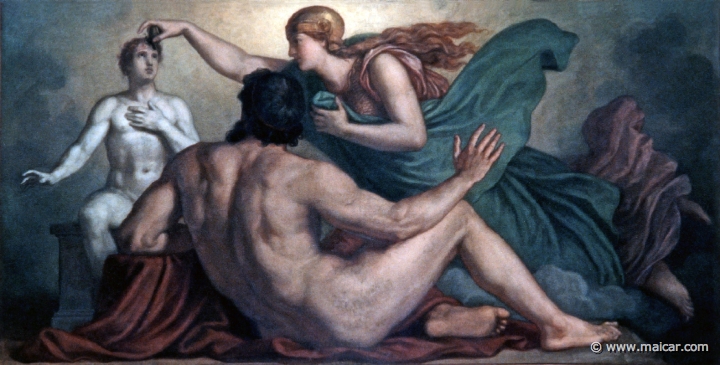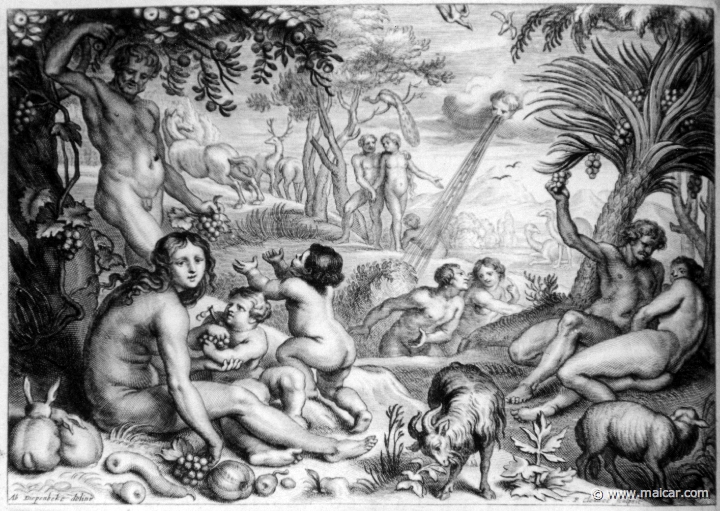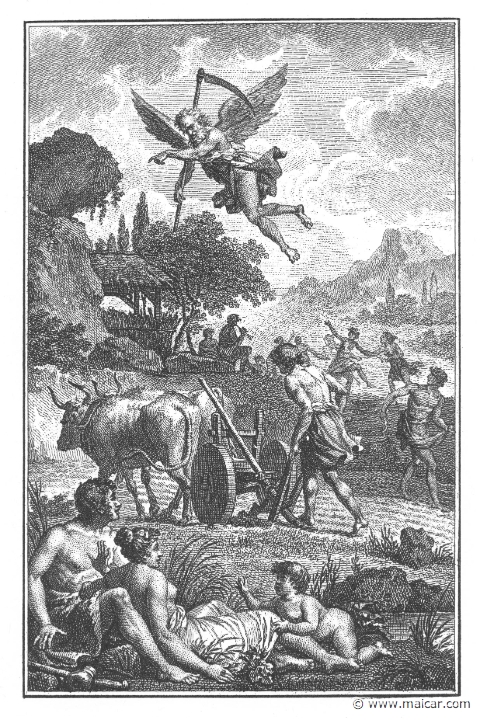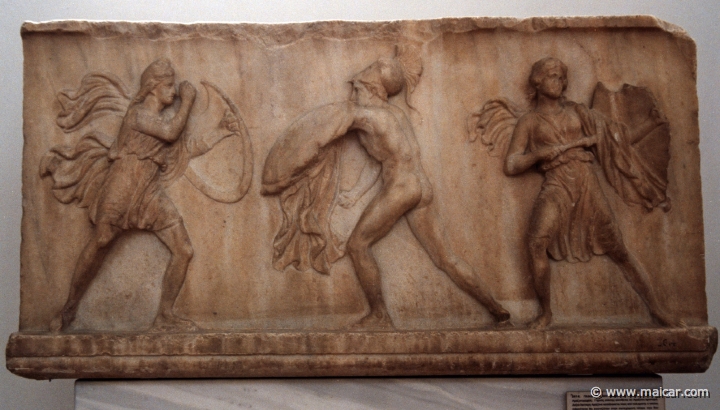 |
|
|

|
Prometheus 1 watches as Athena gives a soul to the moulded man. 3807: Prometheus and Athena (Creation of Man). Christian Griepenkerl (1839-1916): Beseelung der menschlichen Tonfigur durch Athena. Griepenkerl-Gemälde im Treppenhaus des Augusteums, Oldenburg.
|
|
|
Prometheus 1 moulded man
Prometheus 1 is known as the benefactor of mankind. He gave them fire, which—unknown to Zeus—he stole from Heaven and hid in a stalk of fennel. For having thus deceived the gods, he was kept bound for many years on Mount Caucasus, where an eagle swooped on him every day and devoured his liver, which grew again by night. But it has also been said that the same Prometheus 1 moulded the race of mankind, which he later helped, out of water and earth. And since these elements would not suffice, Athena, the goddess of prudent intelligence, animated that moulded man by giving him a soul.
"Nor was the deity content to care for man's body. What is of yet higher moment, he has implanted in him the noblest type of soul." (Socrates. Xenophon, Memorabilia 1.4.13).
The story of Cura
Concerning the soul and body of man and the origin of both, also this story has been told: Cura, they say, fashioned a man out of mud and asked Zeus to give him life. The god granted his request, but forbade her to call man after herself, as she wished, since the god desired to call him after himself. However, Gaia intervened and declared that it should have hers, since it was made out of her own body. It is said that Cronos decided the dispute, letting Zeus take the soul and Gaia the body, after death. Cura would possess him as long as he lived, for having fashioned him; and his name would be Homo, since he was made from humus.
One race, several ways
Once the race is in existence, men are—sometimes—born from a father and a mother. At other times—namely when the motion of the universe is reversed—men have no parents, but they just arise from the ground like a plant does; these are called AUTOCHTHONOUS or "sons of the soil", and they are the dead coming back to life and getting younger as they live.
Body and Soul
|
"Wonders are many, and none is more wonderful than man." (The Theban Elders. Sophocles, Antigone 332).
"Which, think you, deserve the greater admiration, the creators of phantoms without sense and motion, or the creators of living, intelligent, and active beings?" (Socrates. Xenophon, Memorabilia 1.4.4).
"And do you suppose that wisdom is nowhere else to be found, although you know that you have a mere speck of all the earth in your body and a mere drop of all the water, and that of all the other mighty elements you received, I suppose, just a scrap towards the fashioning of your body? But as for mind, which alone, it seems, is without mass, do you think that you snapped it up by a lucky accident . . . ?" (Socrates. Xenophon, Memorabilia 1.4.8).
|
|
|
|
|
Yet others have put forth these alternatives: Either that man was made of the divine substance of the god who fashioned everything, or else he was created out of the earth, which had retained some elements of the sky when they were separated. In any case this new creature—they believe—is made of a divine substance and is therefore finer, being able to produce higher thoughts and, by standing erect, to turn his eyes to Heaven.
Like gods
This is why man is the only creature able to apprehend the existence of the gods, worshipped otherwise by no other race of living beings. The soul of man, some affirm, is the most apt to make provisions against hunger or thirst, cold or heat, the best suited to relieve sickness, and the most capable for acquiring knowledge by toil, remembering all that is seen, heard or learned. And whereas grovelling creatures were given feet only, man was endowed with hands, which are, as they call them, the instruments of his greater happiness. And again: although other creatures also have a tongue, that of man enable him to articulate his voice and express himself through speech. Similarly, it has been pointed out that whereas for many other creatures the gods have prescribed a fixed season of sexual indulgence, for men they have only set Old Age as time limit. For these and other reasons, they assert that—in comparison with the other animals—men live like gods. |
"… before the Cretan king, Dictaean Jove, held sway and an impious age of men began to feast on slaughtered oxen, this life was led on earth by golden Saturn, when none had ever heard the trumpet blown or heard the sword-blade clanking on the anvil." (Virgil, Georgics 2.534).
|
|
|
Everlasting spring
There was first a golden race of mortal men who lived in the time of Cronos when he was reigning in heaven. They lived like gods without sorrow or toil, and they did not know Old Age. And although they died, it was as if they were overcome with sleep. It is said that the earth bare them fruit abundantly and yielded without compulsion all needful things. For spring was everlasting, streams of milk and nectar flowed, and honey was distilled from the oak.
No law was necessary
This Golden Age is described as the first age which compelled no one, kept faith and did the right. Men dwelt in ease and peace upon their lands with many good things and loved by the gods. There was no law and therefore no fear of punishment. There were no cities, no swords or helmets, no foreign nations were attacked in war, nor did anyone sail over the seas. During this time, to mark the land with private bounds would have been wrong since men worked for the common store.
No war was necessary
|

|
2602: The Golden Age. Les METAMORPHOSES D’OVIDE EN LATIN ET FRANÇOIS, DIVISÉES EN XV LIVRES. TRADUCTION DE Mr. PIERRE DU-RYER PARISIEN, DE L’ACADEMIE FRANÇOISE. MDCLXXVII.
|
|
Some have said that during this age of Cronos all the parts of the universe were divided in regions, each ruled by a different god. There were no wild creatures and the animals, being ruled by divine shepherds, did not eat one another. In the same way, there was no war among men, for they were ruled by a high deity. There were no states or families; and since they all came to life coming out of the earth and with no memory of their previous lives, they did not possess wives nor did they have any children. At this time, the universe revolved backwards; and, the climate being tempered, the men of this age lived in the open air without clothing, receiving from the earth all they needed although they did not work in agriculture. And since the universe revolved backwards they became younger as they lived.
Whom Justice loves
At this time Justice had not yet left the Earth; and when she did, she planted her last footprints among those who cherished an easy livelihood, and kept themselves away from the clash of arms and from the palaces with arrogant portals. For those who live in peace and innocence, worship the gods, feel reverence for Old Age, and have for leisure what nature and earth generously provide, resemble the men of the Golden Age.
No one believes in it
This is what the Golden Age has been credited with, and that is why men of other ages talk of a "golden age" whenever they remember any advantageous circumstances of the past, be it a low rate of crime, low taxes, or higher profit. But were they asked whether they believe in the Golden Age of Man, most of them would refuse it credence; for a man of his times can only regard other ages as products of imagination. And yet, those times may return:
"This is he . . . who shall again set up the Golden Age amid the fields where Saturn once reigned. . ." (Virgil, Aeneid 6.790).
|
|

|
01009: The Silver Age. "After Saturn had been banished to Tartarus, and the world was under the sway of Jove, the silver race came in ..." (Ov.Met.1.113). Guillaume T. de Villenave, Les Métamorphoses d'Ovide (Paris, Didot 1806–07). Engravings after originals by Jean-Jacques François Le Barbier (1739–1826), Nicolas André Monsiau (1754–1837), and Jean-Michel Moreau (1741–1814).
|
|
"Behold what manner of race the fathers of the Golden Age left behind them! Far meaner than themselves! but you will breed a viler progeny! Verily wars and cruel bloodshed shall be unto men and grievous woe shall be laid upon them." (Dike to the men of the Silver Age. Aratus, Phaenomena 123).
|
|
|
Second generation
After Cronos was banished, the world was ruled by Zeus. Then the OLYMPIANS made a second generation of men which was of silver and less noble than the race of the Golden Age.
Worse than its predecessor
Neither in body nor in soul was this race as its predecessor. At this time Zeus shortened the spring, and completed the year in four seasons, so that men for the first time sought the shelter of houses; for up to then their homes have been caves, dense thickets, and branches bound together with bark.
Destroyed by Zeus
It was in this age that the first seeds of grain were planted. A child was brought up at his good mother's side a hundred years, playing childishly in his own home. But when they were grown up, they lived only a little time, and that in sorrow because of their foolishness; for they could not keep from wronging one another, nor would they serve the immortals. This behavior angered Zeus, and he put them away.
|
The 3rd generation
|

|
6232: Relief slab, perhaps frieze. Naked hoplite attacks amazon. Middle of the 4C BC. National Archaeological Museum, Athens.
|
|
After the Silver Age came the Brazen race, of sterner disposition and more ready to use arms, but not yet impious. Zeus made this third generation of mortal men sprung from ash-trees.
This race—terrible and strong—was in no way equal to the race of the Silver Age. They loved war and all deeds of violence. They ate no bread, and their hearts were hard like adamant. The armour of these fearful men was of bronze, and so were their houses, along with all their implements, since there was no iron. These men, some say, were destroyed by their own hands, and perished leaving no trace. But others say that this generation was destroyed by The Flood in the time of Deucalion 1.
The heroic race
When the Bronze generation was extinguished, Zeus made yet another, the fourth, which was nobler and more righteous: a god-like race of heroes, called demigods. This is the race before our own. Many among these men were destroyed by wars, like those that took place at Thebes and Troy. But to some, Zeus granted an abode apart from other men, letting them dwell—untouched by sorrow—at the ends of earth, in Elysium or in the Islands of the Blest, where the earth bears grain and fruit thrice a year. Yet they live far from the gods, being ruled by Cronos, whom Zeus released from his chains.
|
|
Life of toil
Zeus made yet a fifth generation of men, and with it began, after the Bronze & Heroic Ages, the Age of Iron. It is said that all evil burst forth into this baser age, which is our own: Men never rest from labor and sorrow by day, and from perishing by night. Modesty, truth, and faith leave the earth, and in their place come tricks, plots, traps, violence, and unbridled love of profit. The ground, which had been common possession, is now neatly marked with boundary-lines. Men demand of the fields, not only the sustenance they provide with their surface, but also what is in the very bowels of the earth, bringing to light the wealth buried and hidden away by the gods.
Iron and gold
Not only hard iron came with this age; but also gold, which is even worse than iron. And with both war came, and so men found it natural to live on plunder: The guest cannot trust his host, and affection among brothers became rare. The husband started longing for the death of his wife, and she for the death of her husband. Piety was vanquished, and Astraea (Dike)—the last of the immortals—left the earth (if she had not done so before).
Doomed to destruction
Zeus will destroy this race of mortal men too: For the father will not agree with his children, nor the children with their father, nor guest with his host, nor comrade with comrade, nor will brothers love each other as once they did. Men will dishonour their parents as they attain Old Age, without repaying them the cost of their nurture. Might shall be right, so that one man may sack another man's city. There will be no merit for the man who keeps his word, or for the just, or for the good; rather, men will praise the evil-doer and admire his audacity and violent dealings. Strength will be right, and respect will vanish as an empty word. Peace being banished, the MUSES will depart; therefore they will lead a life in ugliness. The wicked will hurt the worthy, speaking false words against them; therefore will Envy walk along with them. The gods will forsake mortal men, letting bitter sorrows fall upon them; and being defenceless like children in the wilderness, they will not find any help against all evil they themselves created.
|
|